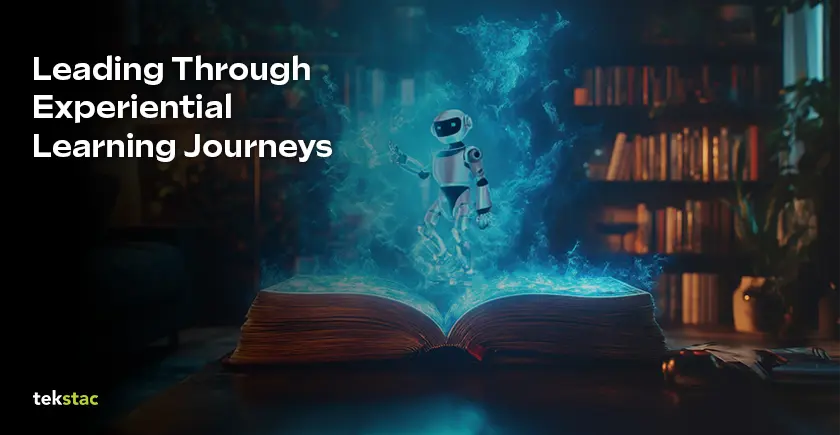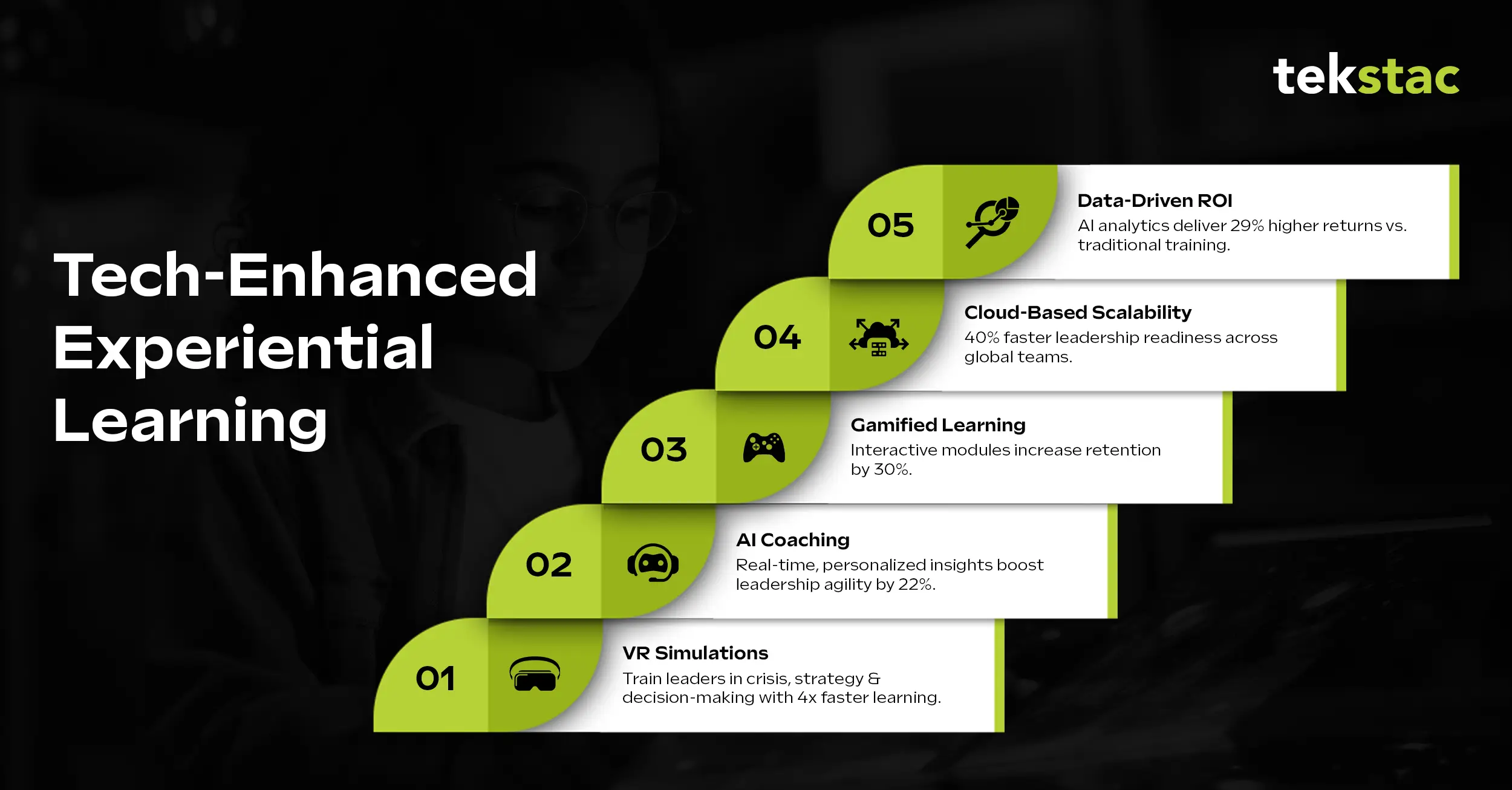Why Experiential Learning Is the Future of Leadership Development

Last updated on February 25th, 2026
Leadership isn’t taught in classrooms. It is built through Experiential Learning. The best leaders do not emerge from lectures. They grow by facing real-world challenges. For decades, organizations have relied on workshops, PowerPoint slides, and leadership books to train future leaders. But the hard truth remains that theory alone does not create great leaders. Experience does.
Leadership is about making tough calls in unpredictable situations. In high-pressure moments, leaders must decide, adapt, and lead in real time, often with incomplete information and conflicting priorities.
Studies show that people retain up to 75% of what they learn through experiential methods, compared to just 10% of traditional lectures.
Why Traditional Leadership Training Falls Short
Companies spend billions on training programs yet leaders often fall back into old habits once they return to their daily routines.
Why?
Because real leadership challenges aren’t solved in classrooms—they happen in high-pressure moments, under uncertainty, and with real consequences.
- No Real-World Application
- Sitting in a workshop doesn’t prepare leaders for messy, high-stakes decisions where emotions, time pressure, and unexpected challenges come into play.
- Lack of Organizational Support
- Even well-trained leaders can’t apply new skills if company culture, outdated processes, or resistant teams don’t support them.
- Training in Isolation
- Leadership isn’t a solo act. If the entire organization isn’t evolving, even the best-trained leaders will struggle to make an impact.
Leadership isn’t learned—it’s lived. Companies that want real change must integrate learning into daily work, redesign systems, and create environments where leadership thrives.
From Theory to Practice: Why Experiential Learning Drives Real Leadership Growth
Be honest, have you ever mastered a skill just by reading about it?
Leadership, problem-solving, and critical thinking don’t come from theory alone; they come from experience.
Here’s why shifting from theory to experiential learning isn’t just important—it’s necessary.
- Knowing vs. Understanding:
- You can read a hundred books on negotiation, but until you sit in a high-stakes deal where emotions run high, competing interests clash, and real money is on the table, you don’t actually know how to negotiate.
- Experience forces you to think on your feet, adapt, and refine your skills in ways that theory never can.
- People Don’t Learn the Same Way—So Why Teach Them the Same Way?
- Some people absorb knowledge by watching and analyzing; others learn by doing, failing, and adjusting.
- Traditional learning assumes a one-size-fits-all model, but experiential learning embraces different learning styles, ensuring that people engage with knowledge in ways that make sense to them.
- Reflection is Just as Important as Action
- Learning isn’t just about doing, it’s about analyzing what worked, what didn’t, and why. Without this, experiences remain just events.
- According to David Kolb’s Experiential Learning Theory, learning is a continuous cycle of experience, reflection, conceptualization, and experimentation. This model known as Kolb’s Learning Cycle illustrates how real growth happens: leaders face challenges, reflect on outcomes, extract insights, and apply them in new contexts, transforming experience into instinctive capability.
- The true power of experiential learning is in the ability to reflect, refine, and reapply knowledge dynamically.
The truth is, knowledge that stays theoretical is wasted potential. Until people engage with what they’ve learned, test it in different environments, and adapt it to new challenges, it never becomes truly useful.
How Experiential Learning Builds Unshakable Leaders
Leadership isn’t something you’re born with—it’s something you earn. It’s built in the moments of pressure, uncertainty, and tough calls. And let’s be real—there’s no skipping this part.
Every great leader must go through the fire, testing their decision-making, adaptability, and communication skills before they ever step into high-stakes situations.
That’s why simulation-based training isn’t just useful—it’s non-negotiable.
Here’s why companies swear by it:
- High-Stakes Decision-Making, Zero Risk: Experience crisis scenarios where every choice has consequences—except, you know, without actually tanking a project.
- Mastering Influence & Communication: Whether it’s handling a tough client or motivating a team, simulations push you to lead with clarity and impact.
- Fail Fast, Learn Faster: Immediate feedback lets you tweak your approach on the spot, sharpening your instincts for the real world.
Leadership isn’t theory—it’s action. And simulation-based training ensures you’re battle-ready before the real fight begins.
Technology-Driven Experiential Learning: The Future of Leadership Development
With business landscapes becoming more unpredictable, organizations need leadership development strategies that mirror real-world complexity.
This is where technology-driven experiential learning solutions are making a measurable impact, helping companies build adaptable, future-ready leaders.

1. VR Creates High-Stakes, Risk-Free Learning
- Real-time leadership simulations mirror real-world crisis management, decision-making under uncertainty, and strategic negotiations—helping leaders refine their instincts.
- Impact: Research indicates VR-based leadership training accelerates learning by 4x and enhances application confidence by 275%.
- Why It Matters: Leaders develop practical experience before encountering high-pressure situations, reducing failure risks in real business environments.
2. AI Delivers Personalized, Adaptive Leadership Coaching
- AI-driven platforms analyze decision patterns, track behavioral insights, and offer personalized coaching—enhancing leadership growth dynamically.
- Impact: AI-powered experiential learning has led to a 22% increase in strategic decision-making accuracy, fostering better leadership agility.
- Why It Matters: Continuous, real-time feedback enables leaders to improve instantly, unlike static, one-size-fits-all training modules.
3. Gamification Enhances Retention and Engagement
- Interactive challenges, real-world business scenarios, and reward-based learning make leadership training engaging and results-oriented.
- Impact: Studies show a 30% increase in knowledge retention when gamification is integrated into leadership development programs.
- Why It Matters: Leaders actively engage with learning rather than passively consuming content—leading to long-term behavioral transformation.
4. Scalable, Standardized Leadership Development
- Cloud-based experiential learning platforms ensure leadership training is consistent across teams—whether remote, hybrid, or on-site.
- Impact: Digital learning frameworks have been linked to a 40% faster leadership readiness rate, ensuring talent pipelines remain strong.
- Why It Matters: Scalability eliminates geographical training barriers, making leadership development seamless across global teams.
5. Data-Driven Insights for Measurable Leadership Growth
- Advanced learning analytics help organizations track leadership performance, refine training methodologies, and optimize talent strategies.
- Impact: Companies leveraging AI-driven insights in leadership development report a 29% higher ROI compared to traditional training methods.
- Why It Matters: Leadership development is no longer guesswork—it is measurable, data-driven, and continuously evolving.
Why Forward-Thinking Companies Are Investing in Experiential Learning
Organizations investing in technology-driven experiential learning solutions aren’t just training leaders—they are equipping them with the mindset, agility, and strategic acumen required to navigate complexity.
The future of leadership isn’t about static lessons—it’s about dynamic experiences that prepare leaders to thrive in uncertainty and drive real impact.
Companies that are winning—the ones redefining leadership development—aren’t relying on outdated methods.
Case Study: Experiential Learning in Action — Building Leaders Who Deliver
At the end of 2024, a global pharmaceutical company faced a leadership challenge it could no longer ignore. That’s when they made a bold move. Instead of relying on theories, they turned their leadership development program into a real-world lab.
Through immersive simulations, AI-driven coaching, and live crisis scenarios, leaders weren’t just learning; they were experiencing. The shift was immediate. Executives who had once hesitated in boardroom debates were now navigating complex product recalls and regulatory hurdles in risk-free but high-intensity environments.
By December 2024, leadership confidence had skyrocketed, and decision-making agility improved so dramatically that the company saw a 30% reduction in costly delays.
Fast forward to 2025. Inspired by this success, the company expanded its experiential learning model across global offices. Now, instead of hypothetical case studies, leaders in Europe and Asia were stepping into AI-powered crisis simulations where they had to make tough calls in real-time—managing supply chain breakdowns, handling media scrutiny, and rallying teams under pressure.
The impact?
By Q2 2025, the company reported a measurable increase in leadership retention and faster transitions from mid-level managers to senior roles.
For the first time, leadership training wasn’t just a checkbox—it was a competitive advantage.
The lesson?
The future of leadership isn’t about passively absorbing knowledge; it’s about experiencing, reflecting, and evolving in real-time. Companies that embrace this shift won’t just train leaders—they’ll build them.
The Neuroscience Behind Experiential Learning: Why Action Beats Absorption
Learning isn’t just about taking in information—it’s about experiencing it. Neuroscience proves that the more we engage, the more we retain. When we actively participate in learning, the amygdala, the brain’s emotional processor, attaches significance to the experience, making it stick. At the same time, the hippocampus, the center for memory, encodes these moments far more effectively than passive learning ever could.
But the real magic happens when thought meets action. Science calls this embodied cognition—the idea that we don’t just think with our brains; we think with our bodies. When leaders make decisions under pressure, navigate uncertainty, or solve problems in real-world simulations, their brains forge stronger neural pathways, making complex skills second nature. Add in the dopamine reward system, which kicks in when we overcome challenges, and suddenly, learning becomes instinctive, automatic, and deeply ingrained.
This is why top companies don’t rely on lectures or static training—they invest in experiential learning platforms like Tekstac that transform leadership development into a dynamic, high-impact experience.
Conclusion: The Future of Leadership Belongs to Experiential Learning
Today’s leaders are navigating a world defined by volatility, uncertainty, complexity, and ambiguity (VUCA).
A global 2024 study by Harvard Business Publishing confirmed that 70% of organizations now recognize that leadership demands real-world mastery. And as AI, automation, and digital transformation reshape industries at lightning speed, the ability to adapt, strategize, and execute in real-time is more crucial than ever.
Insight Experience’s award-winning leadership programs in 2024 demonstrated how simulations, real-world problem-solving, and immersive coaching are shaping leaders who don’t just know what to do—they instinctively do it when it matters most.
Experience Experiential Learning in Action— See how Tekstac’s platform builds future-ready leaders through immersive, data-driven simulations. 👉 Request a Demo
FAQs on Experiential Learning Leadership
1. What is Experiential Learning?
Experiential Learning is a hands-on approach where people learn by doing rather than just absorbing theory. Instead of passively listening or reading, learners engage in real-world tasks, reflect on outcomes, and apply insights to new situations.
In leadership development, this means practicing decision-making, communication, and problem-solving in realistic scenarios instead of classroom lectures.
Platforms like Tekstac enable this by simulating real workplace challenges leaders actually face — making learning practical, relevant, and immediately usable.
2. Why is Experiential Learning important for leadership development?
Leadership requires judgment under pressure — something theory alone can’t teach. Experiential Learning helps leaders develop instincts through practice, feedback, and reflection.
It builds:
- Confidence in real situations
- Emotional intelligence and communication skills
- Adaptability in uncertainty
- Strategic decision-making ability
With experiential learning platforms like Tekstac, leaders get risk-free environments to test decisions, learn from mistakes, and build capabilities that transfer directly to workplace performance.
3. How does technology enhance Experiential Learning?
Technology makes experiential learning more realistic, personalized, and scalable. Simulations and VR create lifelike leadership scenarios where individuals can practice decision-making under pressure. AI coaching provides real-time feedback based on behavior patterns, helping leaders improve faster. Gamified learning elements keep training engaging and encourage consistent participation.
Platforms like Tekstac bring these together, allowing leaders to learn by doing — safely, repeatedly, and in environments that mirror real business challenges.
4. What are the 4 stages of experiential learning?
Experiential learning follows a proven, repeatable cycle:
- Concrete Experience – Doing or experiencing something.
- Reflective Observation – Thinking about what happened and why.
- Abstract Conceptualization – Turning insights into principles or strategies.
- Active Experimentation – Applying those lessons in the next situation.
Tekstac builds leadership programs directly on this model — ensuring every learning moment moves from experience → insight → improved action.





